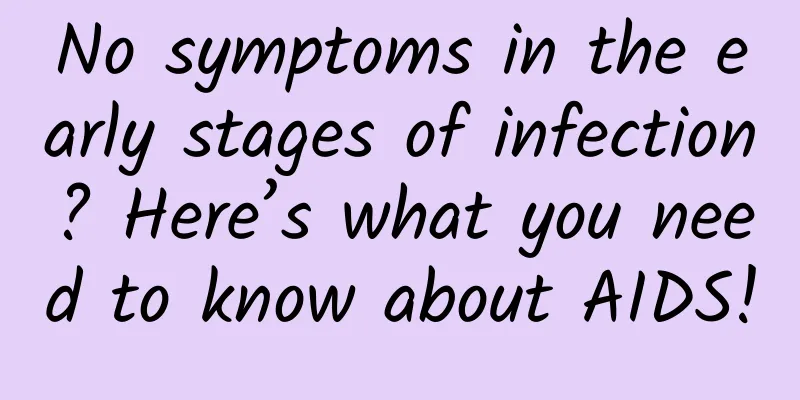No symptoms in the early stages of infection? Here’s what you need to know about AIDS!

|
Do you know where the name of the dreaded disease "AIDS" comes from? In fact, the medical name of AIDS is "Acquired Immune Deficiency Syndrome", and "AIDS" is the transliteration of the English abbreviation. As the name suggests, "acquired" means that the disease is not inherited, but occurs after birth, "immunodeficiency" means that the disease attacks the human immune system and destroys it, and "syndrome" means that AIDS will show a variety of symptoms and signs. Why is HIV so powerful? HIV is a microorganism that is too small to be seen even under an ordinary microscope. After entering the human body, it directly invades the human immune system, interferes with and destroys lymphocytes with anti-infection ability, reduces the body's ability to resist disease, gradually loses the ability to protect the body from bacteria or viruses, and makes the immune system unable to completely eliminate those life-threatening germs. Therefore, AIDS patients will appear very vulnerable. Some bacteria and viruses that would not cause disease in ordinary people may take advantage of their weakness to enter and cause infection; symptoms that appear very mild in ordinary people will become serious and difficult to cure diseases in them. No obvious symptoms in the early stages of infection? It takes a certain amount of time for the virus to reproduce in the human body, so HIV-infected people are not "terminally ill" from the first day of being infected with the virus. In the initial stage, the immune function of the infected person has not been seriously damaged, and the human body has not yet shown obvious symptoms. Such people are called HIV-infected people. Some infected people may experience flu-like symptoms such as fever, muscle aches and rash about 2 to 4 weeks after the HIV virus enters the body. However, these symptoms often do not attract people's special attention, and not all infected people have these symptoms. At this time, the infected people look the same as normal people. When the immune function of HIV-infected people is damaged to a certain extent, other bacteria and viruses will take advantage of the situation and cause the patients to develop various diseases. The manifestations of AIDS can be varied, such as severe diarrhea, pneumonia or certain cancers, and some patients may even develop dementia. At this time, the infected person becomes an AIDS patient. AIDS patients often die from physical exhaustion caused by severe diarrhea, pneumonia, tumors, etc. It should be pointed out that the HIV virus itself does not directly cause death, but it destroys the human immune system, causing the body to lose resistance and become infected with a variety of diseases, which in turn leads to the patient's death. Can HIV survive outside the body? HIV mainly exists in the blood, semen, vaginal secretions and breast milk of AIDS patients and carriers. Therefore, when it leaves the human body, it will be quickly inactivated and basically cannot survive outside the body. Therefore, it will not be infected with AIDS through daily contact, such as shaking hands, hugging, polite kissing, coughing, sneezing, sharing tableware, toilets, bathrooms, swimming pools, bed sheets, clothes, etc. It will not be infected. It will not be infected by touching the telephone, coins, office supplies, labor tools that AIDS patients have touched, and taking public transportation together. At the same time, various studies have not confirmed that mosquito bites can spread HIV. How to prevent HIV infection? Do not take drugs in any way; be cautious when accepting blood transfusions and blood products; do not share needles, syringes, gauze, cotton wool and other equipment with others; do not go to unqualified medical institutions or other places for injections, tooth extractions, tattoos, eyebrow tattoos, acupuncture or surgery; avoid contact with the blood, body fluids or secretions of the injured during daily rescue; do not share equipment that may pierce the skin, such as toothbrushes, razors and electric shavers; seize the golden moment of "blocking" and take anti-blocking drugs within 72 hours after high-risk behavior. If you suspect that you have AIDS, you can go to a medical and health institution with AIDS testing qualifications to obtain testing services. Although the fight against AIDS has been going on for nearly 40 years, there is still no effective vaccine or cure for the disease. Although AIDS cannot be cured, if you have high-risk behaviors, you should get tested as soon as possible to know your infection status and take antiviral drugs as required. Source: Shaanxi Science and Technology Press This article was scientifically reviewed by Wang Mingxu, director of the Center for Health Development and Reform at Xi'an Jiaotong University. |
<<: What is oil called? What is oil formed from?
Recommend
How to treat foul-smelling yellow leucorrhea
Yellow leucorrhea with a foul odor is a symptom e...
After a woman's ovaries become diseased, the hair in this area will definitely increase
The highest compliment the ancients gave to women...
Vagina blisters do not itch but hurt
There are many common gynecological diseases in d...
Cleanliness 4, everything else is normal
What do the four degrees of cleanliness in a gyne...
How to choose a suitable bottle for a baby with cleft lip and palate?
Children with cleft lip and palate or cleft palat...
Is it good for women to take Jinkui Shenqi Pills?
To live a healthy lifestyle, we need to cultivate...
Can women practice yoga during menstruation?
As more and more people practice yoga now, everyo...
What to do if estrogen and progesterone are low? Four ways to solve it
Many pregnant women always have low estrogen and ...
Clinical manifestations and symptoms of lobular hyperplasia during lactation
Many women experience lobular hyperplasia during ...
National Disability Prevention Day | Protect your hearing and don’t let your life be muted
Hearing impairment is the fourth leading cause of...
What to do if the underwear is too small?
Underwear is a special piece of clothing for wome...
After the abortion test paper is still positive
Many women have had abortions. Some people still ...
17 weeks pregnant, stomach pain
After going through the uneasy early pregnancy, e...
Can I massage my breasts while pregnant?
When you are preparing to become pregnant, you mu...









